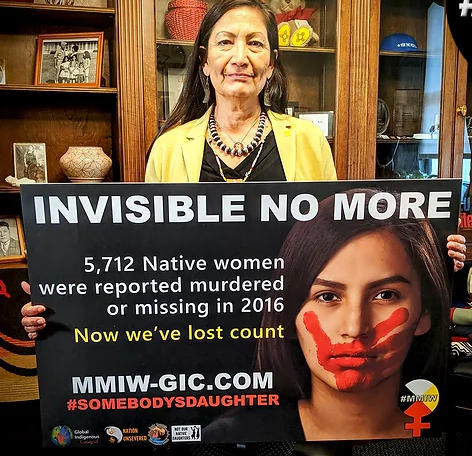
- Details
- By Grace Terry, contributing writer
Native community members who are survivors of or have been impacted by the Missing and Murdered Indigenous Peoples (MMIP) crisis are invited to attend to share their testimony. Those who wish to attend the hearing must register at here.
Those unable to attend the hearing in person can submit written testimony, recommendations, or questions to the Not Invisible Act Commission at: [email protected]. Include the following in the subject line: “NIAC Testimony” or “NIAC Question.”
In October 2020, the Not Invisible Act of 2019 was signed into law as the first bill in history to be introduced and passed by four U.S. congressional members enrolled in their respective federally recognized tribes. The four were led by Secretary of the Interior Deb Haaland (Pueblo of Laguna) during her time in Congress.
The act was a response to the longstanding crises of MMIP and human trafficking (HT). The purpose of the act is to increase coordination in identifying and combating violent crime within Native lands and against Native Americans.
In accordance with the act, Attorney General Merrick Garland and Secretary Haaland established the Not Invisible Act Commission. The Commission is a cross-jurisdictional advisory committee composed of both federal and non-federal members. These include law enforcement, Tribal leaders, federal partners, service providers, family members of missing and murdered individuals, and survivors.
Since April, the Commission has been holding field hearings in Tulsa, Anchorage, Flagstaff, Minneapolis, and Albuquerque, some of the communities most affected by the MMIP crisis. The Billings, MT, hearing later in July is the final hearing. Similar to earlier hearings, the Billings event will provide a forum for law enforcement, subject-matter experts, organizations, State/Tribal task forces, advocates, survivors/families, and others to offer testimony directly to the Commission. Trauma-informed mental health support will be available on-site with optional follow-up support as needed.
Deputy Attorney General Lisa Monaco emphasized, “The Justice Department is steadfast in our pledge to work with Tribal governments in preventing and responding to the violence that has disproportionately harmed Tribal communities. And we are committed to listening and being responsive to what our partners have to say.”
In a June 8, 2023, letter to Tribal leaders, Secretary Haaland said, “Only with the collective participation of all our communities will our missing, murdered, or trafficked relatives and friends no longer be invisible.”
Carmen O’Leary (Cheyenne River Lakota) of Eagle Butte, SD, is the Executive Director of the Native Women’s Society of the Great Plains. According to O’Leary, “It is important to our community that the people have input, whether it is by contributing a personal story, offering a possible solution to address the problem, or helping to identify gaps in the (prevention/enforcement/service) system. The actions of the (Not Invisible Act) Commission will impact resources available to address MMIP issues for a long time.”
Findings from hearings and written testimony will shape the Commission’s final report to Secretary Haaland, Attorney General Garland, and Congress. This report is required by October 2023 and will include recommendations for how to improve intergovernmental coordination, bolster resources, and establish best practices for State/Tribal/Federal law enforcement to challenge the tragic epidemic of MMIP violence and human trafficking.
Elizabeth Hidalgo Reese is a member of Nambé Pueblo and senior policy advisor for Native American affairs at the White House. At the June 28 Not Invisible Commission hearing in Albuquerque, she acknowledged the victims and families present at the hearing and how critical their testimony is to create solutions to the crisis.
“These hearings are so important,” Hidalgo Reese said. “Neglect and invisibility are too often the cause or enable violence in our communities ... we need to understand this problem from every angle. We need to explore every possible solution, so we need to hear from all of you.
According to data from the Centers for Disease Control and Prevention, Native women living on reservations are murdered at a rate ten times higher than the national average. Layered jurisdiction, lack of collaboration between law enforcement bodies, and systemic apathy have led to thousands of unsolved cases in Indian Country. The Bureau of Indian Affairs estimates there are 4,200 unsolved MMIP cases.
Secretary Haaland made the following statement when the schedule of hearings was announced in February 2023, “This work requires each of us to face our own trauma, to relive unimaginable pain, and visualize a future in which our loved ones are safe, and our communities have closure. We’re here for our children, grandchildren, and relatives we have yet to meet. This work is urgently needed and requires all of us to work collaboratively. I am so grateful to the Commission for the work they are doing and the lasting impact they will have.”
The Commission will hold a national, virtual field hearing in August.
Help us defend tribal sovereignty.
At Native News Online, our mission is rooted in telling the stories that strengthen sovereignty and uplift Indigenous voices — not just at year’s end, but every single day.
Because of your generosity last year, we were able to keep our reporters on the ground in tribal communities, at national gatherings and in the halls of Congress — covering the issues that matter most to Indian Country: sovereignty, culture, education, health and economic opportunity.
That support sustained us through a tough year in 2025. Now, as we look to the year ahead, we need your help right now to ensure warrior journalism remains strong — reporting that defends tribal sovereignty, amplifies Native truth, and holds power accountable.
 The stakes couldn't be higher. Your support keeps Native voices heard, Native stories told and Native sovereignty defended.
The stakes couldn't be higher. Your support keeps Native voices heard, Native stories told and Native sovereignty defended.
Stand with Warrior Journalism today.
Levi Rickert (Potawatomi), Editor & Publisher

